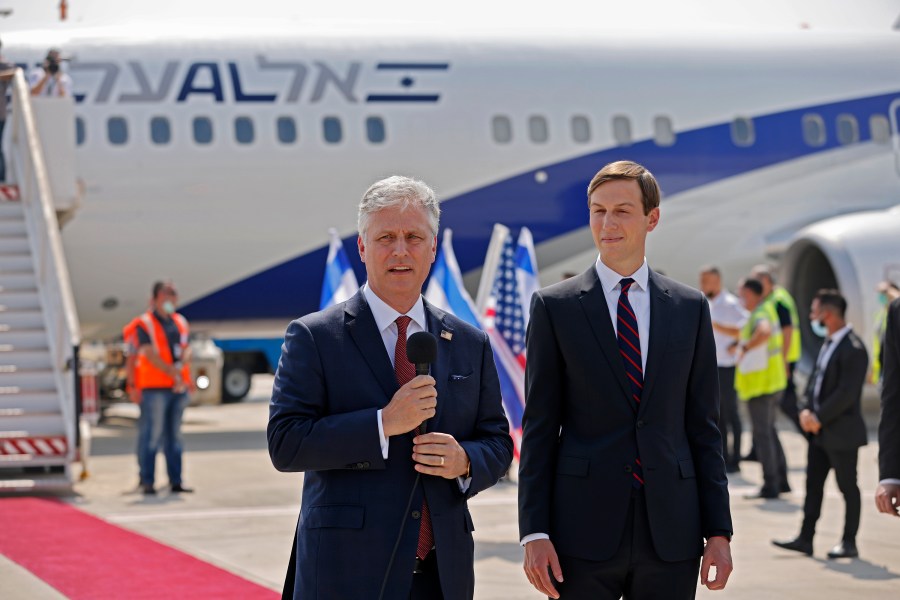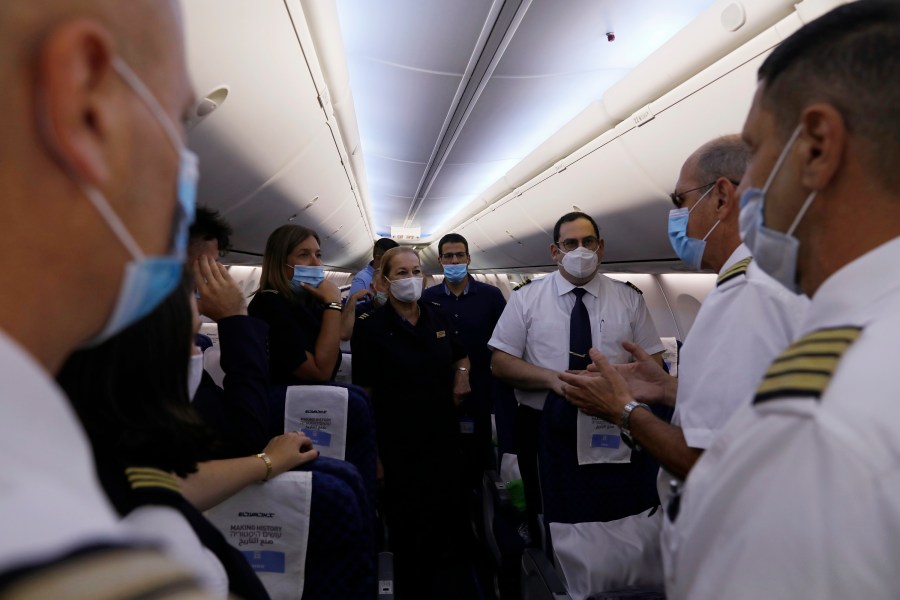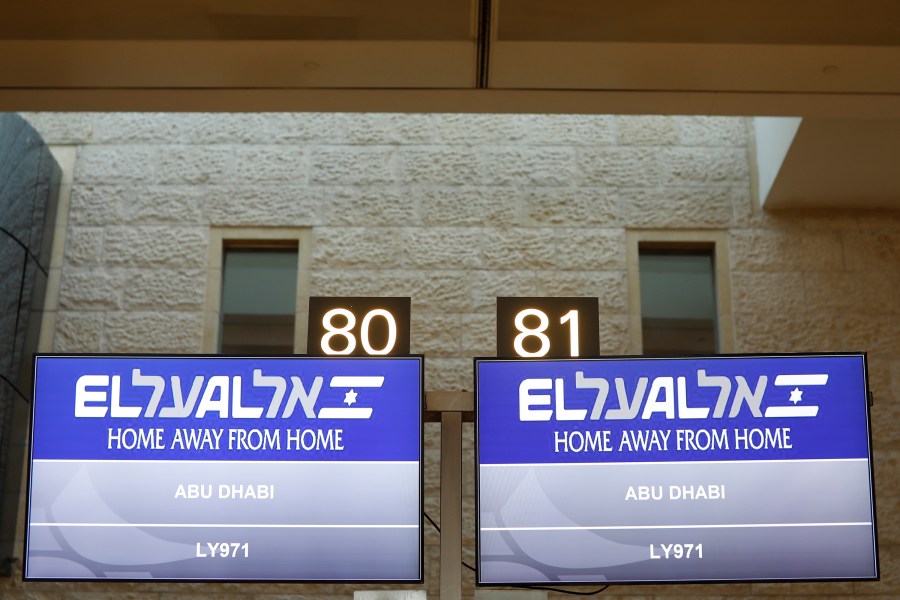Israeli, US officials depart on historic flight to UAE to formalize normalization deal

Israeli National Security Advisor Meir Ben-Shabbat, left, U.S. President Donald Trump’s senior adviser Jared Kushner, center, and U.S. National Security Advisor Robert O’Brien, right, board the Israeli flag carrier El Al’s airliner as they fly to Abu Dhabi for talks meant to put final touches on the normalization deal between the United Arab Emirates and Israel, at Ben-Gurion International Airport, near Tel Aviv, Israel Monday, Aug. 31, 2020. (Nir Elias/Pool Photo via AP)
TEL AVIV (NewsNation) — Top aides to U.S. President Donald Trump and Israeli Prime Minister Benjamin Netanyahu made a historic first flight from Tel Aviv to the United Arab Emirates on Monday to finalize a pact marking open relations between the Gulf power and Israel.
Even before discussions start in Abu Dhabi, the delegates made aviation history when the Israeli commercial airliner flew over Saudi territory on the direct flight from Tel Aviv to the UAE capital.
“That’s what peace for peace looks like,” Netanyahu tweeted, describing a deal for formal ties with an Arab state that does not entail handover of land that Israel captured in a 1967 war.
With the U.S. as matchmaker, Israel and the UAE agreed earlier this month to work toward normalization, which would make the UAE the third Arab nation to have full relations with Israel, after Egypt and Jordan. But unlike those two nations, Israel has never fought a war against the UAE and hopes to have much-warmer relations.
Announced on Aug. 13, the deal is the first such accommodation between an Arab country and Israel in more than 20 years and was catalyzed largely by shared concerns over Iran.
The American delegation on Monday includes President Donald Trump’s senior adviser and son-in-law Jared Kushner, as well as national security adviser Robert O’Brien, Mideast envoy Avi Berkowitz and envoy for Iran Brian Hook. Israel will be represented by national security adviser Meir Ben-Shabbat and the director generals of several ministries, who will meet with their Emirati counterparts.
“While this is a historic flight, we hope that this will start an even more historic journey for the Middle East and beyond,” Kushner told reporters before boarding the plane.
Meir Ben-Shabbat, Israel’s national security adviser and head of the Israeli delegation, said he was excited about the trip and that the aim was to lay the groundwork for cooperation in areas like tourism, medicine, technology and trade.
“This morning the traditional greeting of ‘go in peace’ takes on a special significance for us,” he said.
The El Al flight, numbered LY971 as a gesture to the UAE’s international calling code number, flew into Saudi Arabian airspace shortly after takeoff. That marked another historic first for Israel and at least an acquiescence by the kingdom for the UAE’s move.
Saudi King Salman, along with other Gulf Arab leaders to varying degrees, maintain their boycotts of Israel in support of Palestinians obtaining an independent state. Any long-term flights between Israel and the UAE would require Saudi clearance to be profitable. Otherwise the three hour, 20 minute flight would take more than seven hours.
El Al spokesman Stanley Morais said the 737-900 is equipped with a missile-defense system, a standard feature on these types of planes and a requirement for this flight. After grounding its fleet due to the coronavirus, it is the airline’s first flight since July 1.
The plane was decorated with the the words for peace in Arabic, Hebrew and English above the pilot’s window. Journalists were handed special face masks decorated with the Israeli and Emirati flags. The seat protectors said “Making History” in all three languages, and Israeli folk music played in the background.
The Israeli delegation will stay in the capital, Abu Dhabi, for one night before returning home on El Al flight LY972, a nod to Israel’s international calling code.
Private jets have earlier flown between the two nations as part of covert talks, and Abu Dhabi’s Etihad Airways flew cargo freighters to Israel before to deliver coronavirus aid to the Palestinians. But the high-profile flight Monday, promoted by U.S. officials, looks to place a solid stamp on the surprise Aug. 13 White House announcement of Israel and the UAE establishing ties.
Since then, telephone calls were connected, and the UAE’s ruler issued a decree formally ending the country’s decades-long boycott of Israel. Some Israeli firms have already signed deals with Emirati counterparts, but Monday’s visit is expected to usher in a slew of further business cooperation. The official repeal of the boycott looks to open the door to more joint ventures, such as in aviation, banking and finance.
The UAE has touted the deal as a tool to force Israel into halting its contentious plan to annex parts of the West Bank sought by the Palestinians for their future state. It also may help the Emirates acquire advanced U.S. weapons systems that have been previously unattainable, such as the F-35 fighter jet. Currently, Israel is the only country in the region with the stealth warplanes.
The Palestinians, however, have opposed the normalization, with many expressing worry that it would weaken a long-standing pan-Arab position that called for Israeli withdrawal from occupied territory – and acceptance of Palestinian statehood – in return for normal relations with Arab countries.
Israelis eagerly anticipate the prospect of mutual embassies, expanding tourism to the Gulf and solidifying business opportunities with another country that shares its penchant for technology and innovation.
Israeli Prime Minister Benjamin Netanyahu has touted the deal as validation of his vision that regional peace doesn’t have to go through Palestinian acquiescence and come at the cost of ceding land. But he has come under fire from supporters at home for seemingly giving up on dreams of annexation and tacitly agreeing to a questionable arms sale that could undermine Israel’s regional superiority.
Netanyahu denies such a deal exists.




















